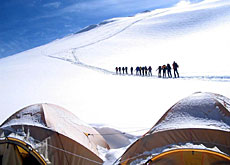
Scientists report back in peak condition

The largest Swiss research expedition in recent years has returned home after conducting experiments in the Himalayas on the causes of altitude sickness.
Around 70 scientists and climbers – some of them volunteers – had spent around four weeks on the 7,546-metre Muztagh Ata mountain in China.
A first group of Swiss test subjects returned from the Pakistani capital Islamabad to Zurich on Thursday. The second group, including the expedition leaders, arrived on Sunday afternoon.
“In general it was a very successful trip,” Urs Hefti, a surgeon at the Aarau cantonal hospital and president of the Swiss Society of Mountain Medicine, told swissinfo.
“We had four main projects,” he said. “One was about the brain and how it works, one about the lungs, another concerned the eyes and then we took blood [samples] up to at least 7,000 metres.”
They also looked into how rapid ascents contribute to conditions such as high-altitude pulmonary edema, acute mountain sickness, and high-altitude cerebral edema.
Analyses of the results are not expected for at least a year.
Limited risks
In all, 48 made it to the top of Muztagh Ata (“Father of Ice Mountains”) near China’s border with Tajikistan.
But a third of the 36 guinea pigs turned back – mostly owing to exhaustion.
Despite the altitude, the risks involved were limited. “It is a very high mountain, but technically it’s not more difficult than your average backcountry ski tour,” explained the expedition’s head guide, Kari Kobler.
Had somebody suffered from an altitude-related ailment, they could reach base camp simply by skiing down the mountain.
Although almost everyone suffered from diarrhoea, had lost weight and was exhausted, nobody was seriously ill, said expedition leaders.
“We were lucky with the weather conditions,” said Hefti. “There was a lot of snow at the beginning which meant we could ski on the mountain.”
“At night it was cold but not too cold. In the high-altitude camps it was about –20°C and in the base camp, it was about zero degrees. We had really good conditions.”
Price of success
Around 100 people began the expedition on July 12, which had been two years in the planning. The 70 Swiss were joined by Pakistani, Nepalese and Chinese climbing specialists, porters and cooks.
The 36 Swiss guinea pigs were chosen – based on their physical and technical aptitudes – from 100 people who were interested in taking part in the expedition.
“We were looking first of all for adults no older than 55 with some climbing experience,” explained expedition co-leader Tobias Merz.
The final hurdle for participants was the cost of the trip – nearly SFr8,000 ($6,323) per person. “With the logistics, research costs and the scientific equipment needed, the final bill could reach SFr1 million,” Merz told swissinfo.
The expedition lasted a total of 33 days with about four weeks being spent on the mountain.
swissinfo with agencies
The 7,546-metre Muztagh Ata is in the Kunlun Shan range, Xinjiang, China.
The peak is only 24 kilometres from the China-Tajikistan border.
The Karakoram Highway, the main road leading to Pakistan, runs nearby.
The expedition was led by Urs Hefti from Aarau and Tobias Merz from Bern, both doctors. Logistics were organised by head guide Kari Kobler.
The trio had already taken part in a similar scientific trip in the Himalayas in spring 2001 up Shishapangma in Tibet.

In compliance with the JTI standards
More: SWI swissinfo.ch certified by the Journalism Trust Initiative




























You can find an overview of ongoing debates with our journalists here . Please join us!
If you want to start a conversation about a topic raised in this article or want to report factual errors, email us at english@swissinfo.ch.